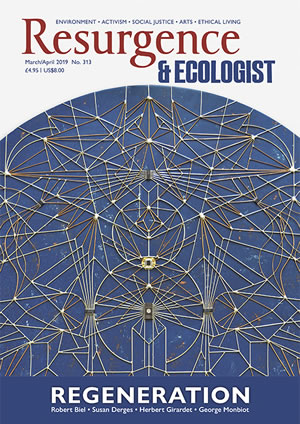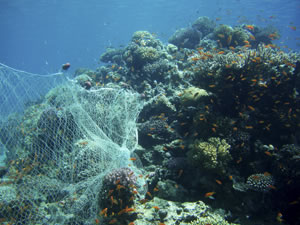Single-use plastic pollution is ubiquitous and tangible – we can see it on our beaches, roadsides and waterways, and it’s even in the seafood we eat and the tap water we drink. Today, there are endless creative initiatives to help limit plastic pollution, from grassroots beach cleans to campaigns for plastic-free supermarket aisles. The momentum sky-rocketed when the final episode of BBC One’s Blue Planet II, which highlighted global plastic pollution for just six minutes, was watched by 11.91 million people – the highest ever recorded ratings for any Nature programme. In 2018, ‘single-use’ was named Word of the Year by Collins Dictionary while ‘plastic’ was Oxford Dictionaries’ Children’s Word of the Year.
Plastic, once hailed as a wonder material, is the biggest threat to our planet – or so some press coverage would like us to believe. As a result, it is arguably the most engaging environmental catastrophe of our time. But are people seeing the bigger picture?
The current wave of interest in plastic pollution shares many factors with the alarming discovery of the hole in the ozone layer over Antarctica in the mid-1980s and the subsequent successful engagement of industry, governments and consumers. This protective layer has significantly recovered since the phase-out of chlorofluorocarbons (CFCs) 30 years ago, after the groundbreaking Montreal Protocol on Substances that Deplete the Ozone Layer was agreed by leading industrial nations in 1987. “There was an obvious cause and effect – it was possible to reduce our usage of CFCs found in aerosols and refrigerants, and manufacturers could stop producing these nasty chemicals in the first place,” says George Marshall, founder of Climate Outreach and author of Don’t Even Think About It: Why Our Brains Are Wired to Ignore Climate Change, who studies how people engage psychologically with climate change.
“That was a very well-constructed problem for us to deal with – it was still complex to understand but more manageable than climate change and similar to single-use plastics in that people could visualise and make sense of it,” explains Marshall, who is concerned that climate change is talked about as an environmental problem. “It’s really an economic and social problem with moral and political complexities – it’s about human rights and armed conflict and so many things,” he argues. “Plastic is in that environmental category, and more deservedly so, but the danger is that people feel they have ticked that environmental box by reducing plastic pollution.”
All the things that make the plastics issue strong make garnering action against climate change weak, according to Marshall. Plastic is something that we hold in our hands, it’s here and now, the impact is immediate, and we can all make direct behavioural changes to reduce that. “With climate change, there is no direct immediate connection. The notion that something you do now will affect something else in some complex way in the future is vague and that’s the big problem.” Marshall argues that the plastic backlash has worked well because it has a really good line-up of the qualities that motivate people: “We have got a trusted communicator, Sir David Attenborough, who played a key role in kicking this off, it’s tangible, you can mobilise your own community to help pick up plastic and reduce waste, and it feels like you can do good.”
Marshall explains that there are three fundamental reasons why it is hard to get people’s attention on climate change: “Firstly, people have a very limited ‘pool of worry’, so if a problem captures our attention, that displaces something else because we only have a certain mental capacity to worry about issues. Secondly, we display ‘single-action bias’ – this is the tendency to take on one single activity with the belief that we have resolved something bigger.” Psychologists hypothesise that this has evolved so that that we don’t worry too much, but face up to problems, solve them, and then move on. The third and final danger is ‘moral licence’: “In order to maintain your sense of being a good person, you adopt an activity that you consider to be good and then use that as an internal justification for something that is not good. This subconscious offsetting is very common, and recycling behaviour is a classic example.”
We need to tip the balance of public awareness in issues like palm oil and ocean acidification and be smart in the way we tell the story so that people can relate to it, says Nick Clark, environment correspondent and anchor for Al Jazeera. “The question is how we set about covering this story to engage a public fatigued and confused by the climate change ‘debate’ that’s been drummed up by those who want to obfuscate the story,” he said. “It’s essential we cover the first world too, not only Bangladesh and the Pacific islands. Just look at the California wildfires, Florida floods and coastal erosion, the hurricanes blowing in. How will that affect us all?”
“We are on the brink of environmental catastrophe, and the most important thing is that nothing distract us from climate change – plastic in the oceans is a tragedy, but not on the same scale as climate change,” Guy Singh-Watson, founder of Riverford Organic Farmers, told me. “People might feel they have done their bit by reducing plastic, and we are intrinsically lazy, so the changes we are prepared to make must really matter.” But that’s not to say Singh-Watson has lost all hope. “We keep using stuff and throwing it away – that’s the mentality we need to fundamentally change, and now there seems to be significant impetus behind it.” He believes that change can be fast, especially when big business gets behind it. “Just as the transition from horses to cars took just 10 years in 1900s America, today there’s a rapid revolution happening with electric cars because the car industry has got behind it.”
Plastic pollution has a powerful narrative that has the potential to open the gateway to real public understanding of fossil fuels and encourage us to switch from the ‘take-make-dispose’ linear model to a more sustainable, circular economy that inspires us to consider our overall carbon footprint and look at the bigger, global picture.








